Ruddygore Or, The Bruja’s Curse
W.S. Gilbert (Libretto) & Arthur Sullivan (Score)
Adapted by David Euresti
Lamplighters Musical Theatre
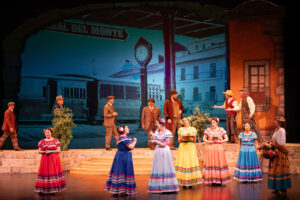
The Company that for seventy-one years has entertained Bay Area audiences with its Gilbert and Sullivan fare has taken one of the pair’s Victorian parodies of the English, nineteenth-century melodrama, Ruddygore, and married it with today’s globally popular soap opera genre of Latin American, the telenovela. Lamplighter Musical Theatre premieres David Euresti’s hilarious adaptation of W.S. Gilbert (libretto) and Arthur Sullivan’s (score) 1887 Ruddygore Or, The Bruja’s Curse in a production that combines the familiar, Gilbert and Sullivan, rapid-fire, rhymed lyrics sung in operatic style with the hugely exaggerated, comically dramatic, and profusely romantic antics of the Latin telenovela. The result is a deliciously delightful, musically pleasing, and spectacularly colorful adventure sure to please the Lamplighter’s traditional audiences and perfectly positioned to attract new aficionados.
David Euresti has cleverly moved the setting of Ruddymore from the original 1800’s Cornwall in England to the Mexican state of Hidalgo, basing the choice on a migration of English miners and engineers that actually took place in 1824 in an effort to revive the flooded mines of Real del Monte. Such a choice allows this libretto to combine English and Latin accents, words, customs, and costumes in a wonderful collage that easily elicits many laughs as the spoof of both yesteryear’s melodrama and today’s telenovela plays out.

The town of Real del Monte is populated by a bevy of “professional bridesmaids” who are greatly dismayed because their local “queen of maidenhood” and most eligible bride, Rosa, continues to turn down all her suitors, thus leaving them with no aisle to show off the bridesmaid’s dresses that they don every day. Rosa has her eyes secretly set on a local farmer, Robin Oakapple, who has “the manner of a Marquis and the morals of a Methodist;” but the little book of etiquette that she constantly carries and consults will not allow her to approach him until he approaches her. For his part, Robin is too shy to make that required first move.
Sabrina Ramona Romero-Wilson sings of her dream to find such a love with flowing, lyrical soprano highlighted by lightly, lingering tremble but also sings with more abrupt, paused notes the cautions dictated by her book of demands (“in plainest print, it’s most unladylike to hint”). When she meets by chance Robin on the town square, their meeting is quite like a Vaudeville skit, each skirting about expressing their true feelings for the other with movements and reactions wonderfully overplayed.
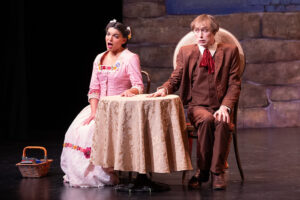
From this first introduction we have of Robin until the closing of the near-three-hour operetta (with one intermission), Noah Evans is reason enough to secure a ticket to see his one-of-a-kind performance. Lanky and awkward, his Robin reminds one in appearance of Washington Irving’s bumpkin, Ichabod Crane. Through his highly physical comedy, idiosyncratic pantomime reactions, and ability to sing with ease rapid-fire lyrics, he also brings to mind a great comic like the late Danny Kaye. Singing in powerful baritone, Noah Evans employs countless, ever-changing facial expressions and eyes that pop, bulge, and round to the size of a quarter in order to elicit more laughter from us as audience.
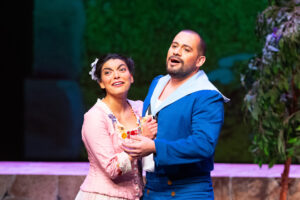
As happens so often in such tales, Robin convinces his foster brother, Richard Dauntless – a cocksure but charming sailor in uniform of blue – to make his case to Rosa and to secure her hand in his stead. As Richard’s entire body hysterically shakes in excitement when seeing Rosa for the first time, Eduardo Gonzalez-Maldonado’s attracting tenor vocals quickly begin to make Richard’s own romantic overtures to a quickly be-smitten Rosa, who a minute before thought she really loved only Robin. As the love-triangle, plot thickens with many twists and turns to come, the salty seadog Richard will also have many chances to prove his comedic mettle, to sing with richly rewarding gusto, and even to dance a sailor’s hornpipe with side hops and steps of jig.
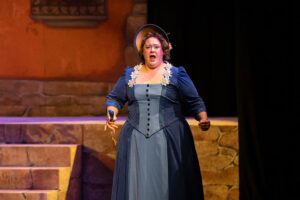
While Rosa now has a choice to make between two wooers, two others in her town long ago had their choices nixed by a witch’s ancient curse on the baronet lineage of the Ruddygores. Rosa’s Aunt Hannah was once “betrothed to a god-like youth,” Sir Rupert Murgatroyd (Charles Martin). In impressively rich contralto, Carly Ozard’s Doña Hannah sings to the maidens of the town her tale of woe. Ten years prior when his older brother suddenly disappeared and supposedly died, Sir Despard was doomed as the oldest, remaining baronet to live out a bruja’s plague on the Murgatroyd family that over twenty generations before had burned the witch at stake. Every Murgatroyd since has been cursed to commit one crime every day of his life or to die a tortuous death.

Likewise, wild-haired, Mad Margaret roams the town in her layers of white, disheveled chiffon singing how she is “love-lonely.” With fully rounded notes and carefully intoned words, Deborah Martínez Rosengaus’ mezzosoprano voice reigns forth in her depiction of the town’s love-crazed street-roamer. Her connection to yet another doomed-to-be-evil baronet, Sir Despard Murgatroyd, is part of the story’s ghostly intrigues to come.
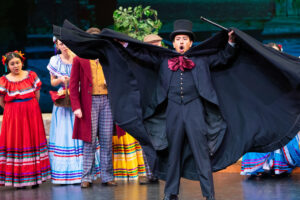
Into what seems to be resolution of the back-and-forth love triangle of Rosa, Robin, and Richard bursts the stereotypical epitome of melodrama evil: A stalking villain in black cloak, cane, and top hat, Sir Despard himself (devilishly played and sung with breathy baritone proficiency by Omar Alejandro). After scaring off a stage full of townspeople, Sir Despard learns from the love-struck Richard a secret of great consequences – the true identity of the meek farmer, Robin. Despard’s older brother is Sir Ruthven, who in fact did not die ten years ago. In a rollicking duet and dance, Richard and Sir Ruthven celebrate their changing fates since the former Robin Oakapple will now himself take over Sir Despard’s daily crime curse, freeing the younger Murgatroyd now to secure Hannah’s hand and allowing the sailor, Richard, to give the waiting bridesmaids the job they have so long been waiting to do for Rosa.
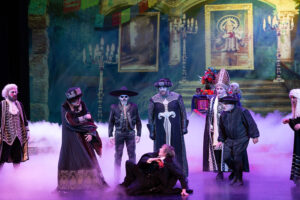
Left to live in a castle full of his evil ancestors’ portraits is now Robin-turned-Ruthven, providing us audience with an upcoming Act Two with many ghoulish ups and downs for our hero as the ghosts of his past come to life.
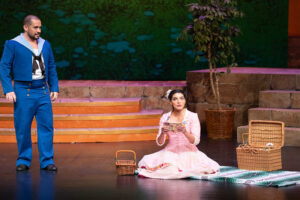
David Euresti directs his adaptation with an eye for fun and funny. When Richard and Rosa are crooning their sudden initial attraction, towns women quickly set up a modern-looking picnic with iced champagne, box of chocolates, and bouquet of flowers to help seal the deal – just one of many, unexpected touches to add to the laughs. The humor is further enhanced by the videography Peter Crompton employs in his set design, with – as one example – the gallery of the newly doomed Sir Ruthven’s ancestors suddenly becoming peering, prying personalities ready to intervene to ensure the latest baronet is indeed evil enough.
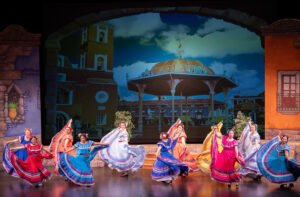
Karina Padilla has choreographed many sequences of traditional, Mexican dances in the style of Baile Folklórico for the large group of bridesmaids and villagers to fill the stage in a variety of circling, swaying, and foot-tapping. The dances come to a rainbow array of stunning colors as skirts are raised on the two sides of each bridesmaid – beautifully ribboned and decorated costumes designed by Callie Floor along with the imaginative and often laugh-out-loud costumes of villains, ghosts, a bumbling Robin, and a cocky Richard. The make-up of Vanessa Lee Blanchard is particularly eye-popping on the Day of the Dead faces of the likes of Sir Roderic.
Music Director Baker Peeples captures the variations of Sullivan’s score as he ably conducts the orchestra of twenty-five-plus. Woodwinds are particularly impressive as in the lead-in to Mad Margaret’s rambunctious aria; but composer Sullivan has generously given all instruments a chance at one point or another to shine as the score’s moods shift to intrigue, mesmerize, excite, and surprise.
Gilbert’s libretto as adapted by David Euresto sports a pace that never falters in the first act. While the second certainly has wonderful highlights – especially when the ghosts emerge to haunt and hound a highly frightened Sir Ruthven – a couple scenes like one between Sir Despard and Mad Margaret drag a bit in energy and interest.
However, the energy and exuberance overall sparkles in this highly entertaining and satisfying Lamplighters adaptation of Ruddygore Or, The Bruja’s Curse where parodies of English melodrama and of Mexican telenovela mix and mingle triumphantly to tease and tickle us as an audience.
Rating: 4 E
Ruddygore Or, The Bruja’s Curse continues March 2-3, 2024 in production by Lamplighters Musical Theatre at the Mountain View Center for the Performing Arts, 500 Castro Street, Mountain View, CA. Tickets are available at http://lamplighters.org .
Photo Credits: Joe Giammarco
